Characteristics
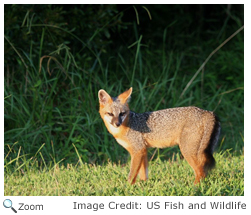 The gray fox is a peppery gray on top, reddish-brown on its sides, chest and the back of its head. Its legs and feet are also a reddish color. It has a long bushy tail with a black stripe on top. The gray fox has pointed ears, a pointed muzzle and long hooked claws. The gray fox is a peppery gray on top, reddish-brown on its sides, chest and the back of its head. Its legs and feet are also a reddish color. It has a long bushy tail with a black stripe on top. The gray fox has pointed ears, a pointed muzzle and long hooked claws.
Range
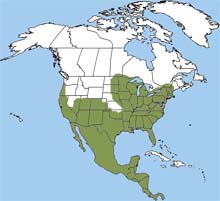 The gray fox can be found from southern Canada to northern Columbia and Venezuela. It is not found in some mountainous parts of the Northwest United States and in the Great Plains. The gray fox can be found from southern Canada to northern Columbia and Venezuela. It is not found in some mountainous parts of the Northwest United States and in the Great Plains.
Habitat
The gray fox lives in a wide variety of habitats but prefers areas with lots of brush or woods.
Diet
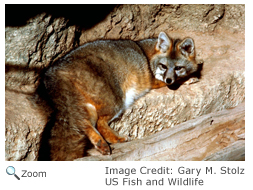 The gray fox is a solitary hunter and eats a wide variety of foods. A large part of its diet is made up of small mammals like mice, voles and eastern cottontail rabbits. It also eats birds; insects; and plants like corn, apples, nuts, berries and grass. In the summer and autumn, grasshoppers and crickets are an important part of its diet. The gray fox is a solitary hunter and eats a wide variety of foods. A large part of its diet is made up of small mammals like mice, voles and eastern cottontail rabbits. It also eats birds; insects; and plants like corn, apples, nuts, berries and grass. In the summer and autumn, grasshoppers and crickets are an important part of its diet.
|
|
Life Cycle
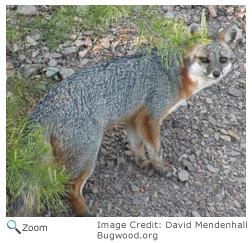 Mating season is between January and April. About 53 days after mating, the female gives birth to one to seven pups. The male helps feed the pups. They are weaned when they are about three months old and are able to hunt on their own when they are four months old. The pups leave their mother in the autumn. The same males and females usually mate together every year. Mating season is between January and April. About 53 days after mating, the female gives birth to one to seven pups. The male helps feed the pups. They are weaned when they are about three months old and are able to hunt on their own when they are four months old. The pups leave their mother in the autumn. The same males and females usually mate together every year.
Behavior
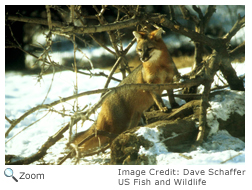 The gray fox can climb and will occasionally forage for food or rest in a tree. It makes its den in rocky crevices, caves, hollow logs and trees. It will sometimes enlarge a woodchuck burrow and use it as a den. Dens are usually used only during the mating season and when raising young. The gray fox can climb and will occasionally forage for food or rest in a tree. It makes its den in rocky crevices, caves, hollow logs and trees. It will sometimes enlarge a woodchuck burrow and use it as a den. Dens are usually used only during the mating season and when raising young.
|